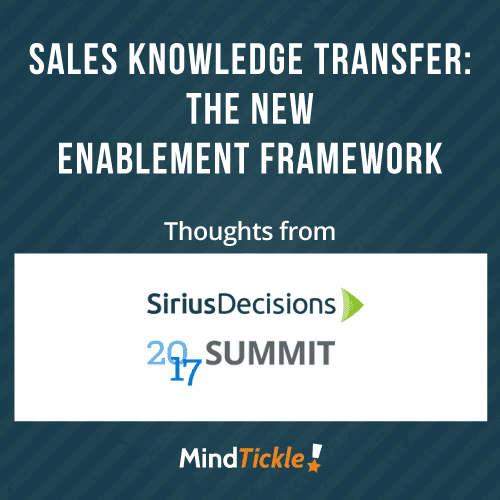Last week, during the
SiriusDecisions Summit 2017
, analysts Peter Ostrow and Christina McKeon unveiled a new framework. This addresses the top challenges sales leaders face today:
- The inability of sales reps to connect their offerings to the needs and challenges of their buyers
- The inability of sales reps to differentiate their product from that of their competitors or the status quo
- Their sales reps’ general knowledge gaps, such as product knowledge, understanding their customer or industry
Resolving these issues is not easy, but the new Sales Knowledge Transfer framework lays out how to approach each challenge. In particular, it focuses on ensuring the sales team can articulate value, connect with buyers, and properly use their knowledge about products, industries, and competitors during each phase of the sales cycle.
Companies that have complex solutions, operate in a competitive environment, or have an evolving product line, are especially vulnerable to these three challenges. Sales enablement leaders need to prioritize and architect how they will educate, assess, certify and keep their sales team up-to-date on a routine basis.
The five phases of knowledge transfer
SiriusDecisions outlined five phases for a successful knowledge transfer program:
- Audience
- Knowledge
- Planning
- Programs
- Adoption
This is an interesting approach that helps focus your enablement efforts in a sequence that builds upon itself to deliver a comprehensive program. The first step involves creating
“Sales Personas”
. The knowledge required is then mapped to each persona before creating an enablement plan and rolling out the program. The final step requires a dashboard that enables you to track adoption and course-correct elements of the program.
Is this involved process too much?
I don’t think so.
In my experience, each of the steps outlined in the key requirements for rolling out a program that will have an impact. In particular, I like the idea of creating “sales personas.” This involves identifying the different types of sellers your organization has, how they best learn and their challenges. This is similar to creating “buyer personas” – but for an internal audience. After all, we all know that one-size-fits-all enablement programs don’t work, but we rarely take the time to truly break down our own sales teams’ needs into different documented personas. This approach will benefit not only the Sales Enablement team but also Product Marketing and Corporate Marketing as well.
Sales Training 2.0?
On the surface, this approach looks like you’re just organizing your sales training better, but there is one major point of difference. Most companies approach sales training as a one-time effort to get their sales reps up-to-speed on a certain topic. This means training is often short-lived and often done in isolation or in response to a particular event (like a new product or a change in selling methodology).
SiriusDecision’s concept of knowledge transfer takes a different approach. Rather than look at what training reps need, it considers what type of sales knowledge they require at each stage of the buying cycle and how it should match different sales events.
Taking a sales enablement perspective, the approach requires you to define all the different ‘knowledge elements’ your sales team needs and determine the best way to achieve this. In addition, it requires consideration of how to ensure the team is actually absorbing the information, certifying them so they can actually use their knowledge in specific sales scenarios, and determining how to identify what else needs to be transferred to the team.
Effectively implementing a ‘knowledge transfer’ program means taking control of what your reps need to know and rolling out a repeatable process. The process shouldn’t disrupt the team, but rather ensure they are always on top of the latest product, customer, industry, and competitive information they require to be successful.
Sales readiness and knowledge transfer
For Mindtickle customers the framework may look similar to our sales readiness approach. Being sales ready involves putting together a process to routinely update your sales team without disrupting their work. At the same time, the process should give them quick access to the knowledge they need to do their jobs effectively.
To address their key challenges, sales enablement leaders should take a closer look at how they are managing the sales knowledge transfer process at their company. By putting in place initiatives that better coordinate enablement efforts for their teams, they can overcome some of the issues that are currently impacting their sales performance.








